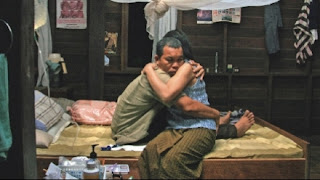 Craig from Dark Eye Socket here with the first of several reports from the 54th BFI London Film Festival. Dave started things off the other day with thoughts on festival opener Never Let Me Go and a grab bag of London delights, but first up for me is a trip to Thailand with this year's celebrated Palme d'Or winner.
Craig from Dark Eye Socket here with the first of several reports from the 54th BFI London Film Festival. Dave started things off the other day with thoughts on festival opener Never Let Me Go and a grab bag of London delights, but first up for me is a trip to Thailand with this year's celebrated Palme d'Or winner. Ah, Uncle Boonmee. You’ll now be able to add the LFF to your lifetime of recollections. File it alongside your many prestigious appearances at other key festivals this past year – the crowning achievement of a Palme d’Or ushering you toward us here in London. Apichatpong ('Joe') Weerasethakul’s latest hothouse bedazzlement, Uncle Boonmee Who Can Recall His Past Lives, is one of the LFF’s flagship titles. Keen festival followers may already be familiar with its plot, but a truncated version goes something like this: in the Thai countryside Uncle Boonmee is suffering from kidney failure; his final days are spent with family – both dead and alive, human and non-human – before he treks to a cave for his last moments.
Typical plot structure is prone to derailment by uncommon and unearthly visuals at any point; strange episodes (remembered moments from his past lives?) pepper the film. [spoilers] One sequence where a scarred princess has awkward, vigorous sex with a talking catfish is both absurdly compelling and stunningly filmed, and certainly something you won’t see anywhere else this, or any, year. Spectral visitations are a regular occurrence round gentle ol’ Boonmee’s house – making him a kind of lovely, reverse Scrooge – and are initially chilling, then rather becalming, especially the huge hair-covered beast with glowering red eyes who looms on a staircase before... sitting down for dinner. Boonmee’s long-deceased wife drops by, too; she materialises several times to the almost comical astonishment of the flesh Boonmee clan. [/spoilers] These characters baffle, but are indispensably alluring. When the film goes off on its wondrously weird whims it becomes pleasingly enigmatic.
Weerasethakul’s films often get posited as litmus tests of the true filmgoer’s arthouse mettle. (Just below ticking off titles on a Béla Tarr checklist.) There’s always guaranteed something soothingly elegiac to be taken from his work; something not always readily graspable, but inarguably extraordinary and sometimes belatedly fulfilling. But with Boonmee there’s a hint of strained repetition in the way he structures and presents – albeit still subtly, and with delicate, personable care – his sparse story. Familiar conceptual totems are present; wondrous shot compositions are correct. But is Weerasethakul in danger of prematurely recycling his already well-used ideas? Both his last two features Tropical Malady and Syndromes of a Century were delightfully invigorating – even during their moments of stasis – but at times Boonmee often feels more like an extension of the same old, same old. I could recall his past films far too easily. (And, for me, the two film "recollections" from his recent ‘Primitive’ installation, Phantom of Nabua and this film’s precursor/side project, A Letter to Uncle Boonmee, served his core concerns well enough.) Still, more hulking, red-eyed jungle beasts wouldn’t go amiss next time. C+
Uncle Boonmee will be reincarnated at the LFF on Sunday 17th and Monday 18th October
related articles: Nathaniel's review from NYFF and Oscar's Best Foreign Film Competitive List.













